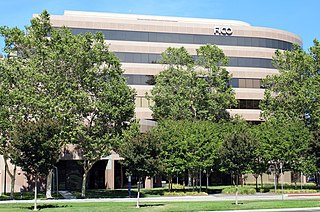Alternative financial services in the United States refers to a particular type of financial service, namely subprime or near-prime lending by non-bank financial institutions. This branch of the financial services industry is more extensive in the United States than in some other countries, because the major banks in the U.S. are less willing to lend to people with marginal credit ratings than their counterparts in many other countries. Examples of these companies include Springleaf, Duvera Financial, Inc., Lendmark Financial Services, Inc., HSBC Finance, Citigroup, Wells Fargo, and Monterey Financial Services, Inc. The more generic name "consumer finance" is also used, although more properly this term applies to financing for any type of consumer.
A credit score is a number that provides a comparative estimate of an individual's creditworthiness based on an analysis of their credit report. It is an inexpensive and main alternative to other forms of consumer loan underwriting.

FICO, originally Fair, Isaac and Company, is a data analytics company based in Bozeman, Montana, focused on credit scoring services. It was founded by Bill Fair and Earl Isaac in 1956. Its FICO score, a measure of consumer credit risk, has become a fixture of consumer lending in the United States.

Franklin Delano Raines also known as Frank Raines is an American business executive. He is the former chairman and chief executive officer of the Federal National Mortgage Association, commonly known as Fannie Mae, who served as White House budget director under President Bill Clinton. His role leading Fannie Mae has come under scrutiny. He has been called one of the "25 People to Blame for the Financial Crisis" according to Time magazine.
A credit history is a record of a borrower's responsible repayment of debts. A credit report is a record of the borrower's credit history from a number of sources, including banks, credit card companies, collection agencies, and governments. A borrower's credit score is the result of a mathematical algorithm applied to a credit report and other sources of information to predict future delinquency.
A credit bureau is a data collection agency that gathers account information from various creditors and provides that information to a consumer reporting agency in the United States, a credit reference agency in the United Kingdom, a credit reporting body in Australia, a credit information company (CIC) in India, Special Accessing Entity in the Philippines, and also to private lenders. It is not the same as a credit rating agency.
In the consumer mortgage industry, debt-to-income ratio is the percentage of a consumer's monthly gross income that goes toward paying debts. There are two main kinds of DTI, as discussed below.
A credit score is a numerical expression based on a level analysis of a person's credit files, to represent the creditworthiness of an individual. A credit score is primarily based on a credit report, information typically sourced from credit bureaus.
VantageScore is a consumer credit-scoring system in the United States, created through a joint venture of the three major credit bureaus. The model is managed and maintained by an independent company, VantageScore Solutions, LLC, that was formed in 2006 and is jointly owned by the three bureaus.
Mortgage insurance is an insurance policy which compensates lenders or investors in mortgage-backed securities for losses due to the default of a mortgage loan. Mortgage insurance can be either public or private depending upon the insurer. The policy is also known as a mortgage indemnity guarantee (MIG), particularly in the UK.
In finance, subprime lending is the provision of loans to people in the United States who may have difficulty maintaining the repayment schedule. Historically, subprime borrowers were defined as having FICO scores below 600, although this threshold has varied over time.
A stated income loan is a mortgage where the lender does not verify the borrower's income by looking at their pay stubs, W-2 forms, income tax returns, or other records. Instead, borrowers are simply asked to state their income, and taken at their word. These loans are sometimes called liar loans or liar's loans. Stated income loans were originated by Ameriquest.
Mortgage underwriting is the process a lender uses to determine if the risk of offering a mortgage loan to a particular borrower under certain parameters is acceptable. Most of the risks and terms that underwriters consider fall under the three C's of underwriting: credit, capacity and collateral.

Observers and analysts have attributed the reasons for the 2001–2006 housing bubble and its 2007–10 collapse in the United States to "everyone from home buyers to Wall Street, mortgage brokers to Alan Greenspan". Other factors that are named include "Mortgage underwriters, investment banks, rating agencies, and investors", "low mortgage interest rates, low short-term interest rates, relaxed standards for mortgage loans, and irrational exuberance" Politicians in both the Democratic and Republican political parties have been cited for "pushing to keep derivatives unregulated" and "with rare exceptions" giving Fannie Mae and Freddie Mac "unwavering support".

In September 2008 the Federal Housing Finance Agency (FHFA) announced that it would take over the Federal National Mortgage Association and the Federal Home Loan Mortgage Corporation. Both government-sponsored enterprises, which finance home mortgages in the United States by issuing bonds, had become illiquid as the market for those bonds collapsed in the subprime mortgage crisis. The FHFA established conservatorships in which each enterprise's management works under the FHFA's direction to reduce losses and to develop a new operating structure that will allow a return to self-management.
In economic policy, alternative data refers to the inclusion of non-financial payment reporting data in credit files, such as telecom and energy utility payments.
The U.S. subprime mortgage crisis was a set of events and conditions that led to a financial crisis and subsequent recession that began in 2007. It was characterized by a rise in subprime mortgage delinquencies and foreclosures, and the resulting decline of securities backed by said mortgages. Several major financial institutions collapsed in September 2008, with significant disruption in the flow of credit to businesses and consumers and the onset of a severe global recession.

The mortgage industry of the United States is a major financial sector. The federal government created several programs, or government sponsored entities, to foster mortgage lending, construction and encourage home ownership. These programs include the Government National Mortgage Association, the Federal National Mortgage Association and the Federal Home Loan Mortgage Corporation.
MicroBilt Corporation is a credit reporting company and alternative credit data provider. Since its founding in 1978, it has grown by acquisition to challenge its larger rivals. Its PRBC consumer credit subsidiary offers consumers the ability to self-report on the bill paying habits as a means of positively impacting their credit score. MicroBilt’s other subsidiaries focus on business credit and services to sub-prime lenders. Many of the company's products are designed to help businesses accurately assess risk on consumers who otherwise have thin traditional credit files. In doing so, credit can be extended to consumers where it couldn't before opening a new customer base to a company and new opportunities to a consumer.
Credit scoring systems in the United States have garnered considerable criticism from various media outlets, consumer law organizations, government officials, debtors unions, and academics. Racial bias, discrimination against prospective employees, discrimination against medical and student debt holders, poor risk predictability, manipulation of credit scoring algorithms, inaccurate reports, and overall immorality are some of the concerns raised regarding the system. Danielle Citron and Frank Pasquale list three major flaws in the current credit-scoring system:
- Disparate impacts: The algorithms systematize biases that have been measured externally and are known to impact disadvantaged groups such as racial minorities and women. Because the algorithms are proprietary, they cannot be tested for built-in human bias.
- Arbitrary: Research shows that there is substantial variation in scoring based on audits. Responsible financial behavior can be penalized.
- Opacity: credit score technology is not transparent so consumers are unable to know why their credit scores are affected.




